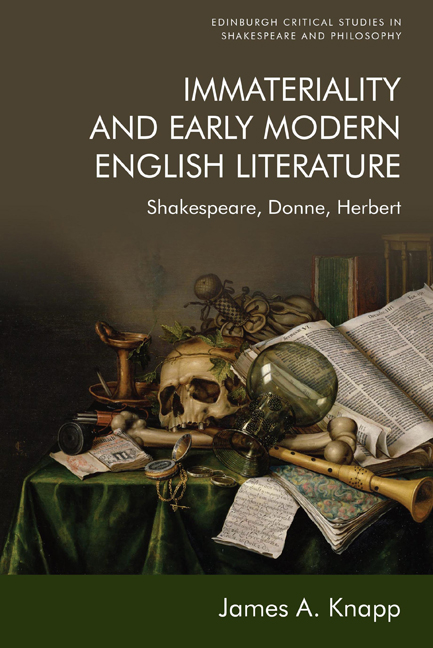5 - The Visible and the Invisible: Seeing the Earthly – Believing the Spiritual
Published online by Cambridge University Press: 10 October 2020
Summary
I can comprehend naturam naturatam, created nature, but that natura naturans, God himself, the understanding of man cannot comprehend. I can see the sun in a lookingglass, but the nature, and the whole working of the sun I cannot see in that glass. I can see God in the creature, but the nature, the essence, the secret purposes of God, I cannot see there.
John Donne, LXXX Sermons, no. VIIThus far, my discussion of the material and immaterial has focused on the way this opposition functioned in early modern ontology. This subject was the supposed purview of the philosophers known in the period as metaphysicians, a distinction derived from the title of Aristotle's Metaphysics, despite the fact that the subject matter was drawn from a range of philosophical authorities who rarely respected a bright line between physics and metaphysics. As we saw in Chapter 3, Shakespeare portrayed Richard's obsession with his identity in explicitly ontological terms: either he is king or he is ‘nothing’. Hal's challenge, more subtle perhaps than Richard’s, was to bring honour into existence, to substantiate it, through action. Focusing on whether Richard's self or Henry's honour exists brings one aspect of the early modern fascination with the immaterial into focus. But of course, in the Renaissance as in the late medieval period before it, the theological implications of ontological propositions could not be avoided. Shakespeare portrays Richard's identity problem as a product of faulty theology as much as vexed ontology. And, in order for the recuperation of Hal's reputation to have any force, his material victory over Hotspur had to make manifest an honour and destiny that lacked material support up to that point in the play. It is difficult to avoid the implication that the roustabout Hal overcomes the much more militaristic Hotspur because he is divinely ordained to do so. Was Hal a naturally superior warrior in some essential way? Perhaps. But, due to the nature of history and time governing the logic of the play, he had already won before the play began, despite the fact that it is difficult, if not impossible to assign this victory to the material conditions of his early life.
- Type
- Chapter
- Information
- Immateriality and Early Modern English LiteratureShakespeare, Donne, Herbert, pp. 159 - 180Publisher: Edinburgh University PressPrint publication year: 2020



